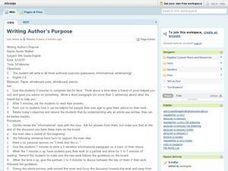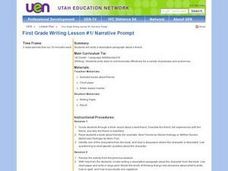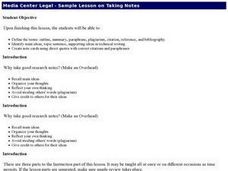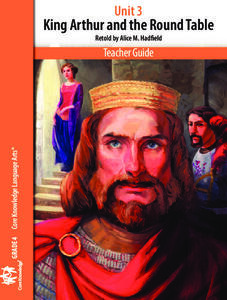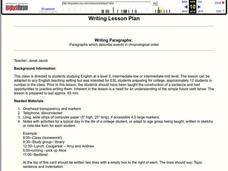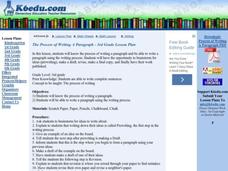EngageNY
Reviewing Conventions and Editing Peers’ Work
Encourage young writers to edit text based on conventions. After reviewing the conventions, fourth graders watch a teacher demonstrate how to revise a paragraph for correct spelling, capitalization, punctuation, or dialogue. Then, pairs...
Curated OER
Writing Author's Purpose
Write in all three authorial purposes (persuasive, informational, entertaining) with this lesson. Young writers consider a time when a friend of theirs helped them out and gave them advice on something. They write a short paragraph (no...
Dream of a Nation
Writing an Analytic Essay
After researching an issue introduced in Tyson Miller's Dream of a Nation: Inspiring Ideas for a Better America, writers develop an original thesis statement and craft an analytic essay using evidence collected in their research.
EngageNY
End of Unit Assessment, Part 2: Drafting Introduction and Conclusion of a Narrative
First and last impressions matter. Scholars compose the introductory and concluding sections of their narrative writing assignments. Also, to prepare for an upcoming performance task, pupils watch a modern-day monologue from the movie...
Curated OER
Narrative Writing vs. Explanatory Writing
The class discusses the different purposes an author has for writing. The focus of the discussion is on writing to tell a true story and writing to give information about a specific topic. There are writing purpose sorting cards embedded...
Virginia Department of Education
Analyzing and Planning Persuasive Writing
Young writers work backward to analyze persuasive techniques. As a class, work through the provided persuasive letter: a plea to an imaginary city council to lift a city-wide ban on fast food restaurants and discount stores. Start by...
Curated OER
Transition Words in Writing
Transition words in writing are the focus of the language arts lesson presented here. In it, learners cut out the word-sort cards (embedded in the plan), and put them into four categories: time, examples, space, and summary. They find a...
Curated OER
Lesson Ideas for Comparing and Contrasting Content
Here are three lesson ideas to help students learn how to compare and contrast information in any content area
Scholastic
Choose Your Words Wisely (Grades 9-12)
Words, words, words. The function of words in persuasive writing is the focus of a group activity that asks members to analyze how words advertisers use are designed to influence targeted audiences.
Curated OER
Grammar - Revise Your Symbols
Explore the different symbols of grammar. Middle schoolers write two sentences using different symbols, including asterisks, apostrophes, and ellipses. They also read and answer guided questions.
Alabama Wildlife Federation
Water Words
Water is an interesting substance that all living things need to survive. Learners focus on the characteristics of water as they create a list of words related to water and then incorporate them into descriptive paragraphs. They then use...
National Endowment for the Humanities
Lesson 1: The First Great Awakening
High schoolers examine the First Great Awakening and how it affected religious belief in colonial America. They read and analyze primary source documents, explore various websites, and write a five-paragraph essay examining the beliefs...
Curated OER
First Grade Writing Lesson #1/ Narrative Prompt
First graders write a descriptive paragraph about a friend.
Curated OER
Paragraph Matching
In this paragraph worksheet, students focus on the usage of a topic sentence and supporting details. Students cut out 6 topic sentences and 6 main body sentences. Students must match each topic to its supporting details.
Curated OER
Creative Writing Lesson Plan
Students practice recognizing the elements needed to produce a piece of creative writing and become aware of those elements in their own original pieces of writings. In groups, they creatively write a new story utilizing all the major...
Curated OER
Lesson Plan C32: Story Starts
Learners write story starters to begin the writing process. In this creative writing lesson, students examine story starters and review the structure of paragraphs. Learners create their own story starters that engage readers by setting...
Curated OER
Sample Lesson on Taking Notes
Have your middle schoolers define the terms outline, summary, paraphrase, plagiarism, citation, reference, and bibliography. They identify the main ideas, topic sentence, supporting ideas in technical writing and create note cards using...
K12 Reader
Something I'd Like to Learn
It's no secret, writing is a lot more enjoyable when it's about something we care about. This simple exercise engages children in producing original writing, while allowing them to share their personal interest with others.
Core Knowledge Foundation
Third Grade Skills Unit 3: How Does Your Body Work?
A skills unit combines ELA and science with lessons that explore the human body. Lessons begin with a reading, go into skills practice, and offer take-home materials. Skills practice includes listening to and discussing a read-aloud,...
Core Knowledge Foundation
Unit 3: King Arthur and the Round Table
Over four weeks, fourth graders study King Arthur and the Round Table, retold by Alice M. Hadfield. Fifteen lessons take pupils through each chapter, complete word work, and the writing process to draft paragraphs, sentences, dialogue,...
Curated OER
Writing Paragraphs
Twelfth graders examine the process of writing a paragraph that describes events in chronological order. They listen to a teacher-led discussion, construct a paragraph in pairs, and independently write a paragraph following the process...
Curated OER
Five Paragraph Essays
Students can learn important writing skills, such as how to complete a five paragraph essay, with these lessons.
Curated OER
Picture It: Teaching Descriptive Writing
There are many fun and effective ways to teach students to write descriptively.
Curated OER
The Process of Writing a Paragraph
Third graders generate a written paragraph by following the 5-step writing process. In this paragraph writing lesson, 3rd graders practice brainstorming, prewriting, revising, creating final drafts, and publishing an original paragraph.



